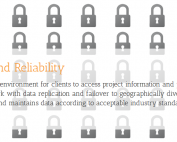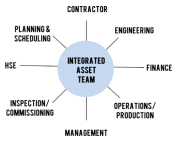Spreadsheets stink for project management
Part I
The larger a project, the more documents project teams need to manage. It’s plain fact. With a growing number of large projects, keeping track of documents becomes quite a chore. This chore becomes a burden for growing organizations, forcing many to implement a third party system. Evidence of this phenomenon is the flood of organizations turning to Google Docs, Share Point, base camp or thousands of others. With so many document management systems (DMS) available, I found myself asking: Why are so many growing organizations using excel spreadsheets to manage documents?
When I started marketing ProjecTools Documents, our DMS system, it seemed like a no-brainer. Who wouldn’t use a third party system instead of a spreadsheet to keep track of documents so integral to organizational functions? Especially engineering and construction firms where information accuracy could make or break a project. After some time, I found four common objections:
- Our spreadsheets have always worked for us in the past.
- We don’t trust a third party with our proprietary information.
- We don’t want to pay for something we already have.
- Our organization won’t change.
I’ll address these objections as we do with clients in the order listed above.
Objection #1 – Our spreadsheets have always worked in the past Ok, document tracking spreadsheets worked in the past. That may be a true statement, but it may not be a valid objection. The reason it may not be a valid objection is that it worked in the past. The key here being past. To test the validity of this objection, I ask: Is it working now? To hash this out, I present a series of True or False statements to determine if the system meets simple DMS standards.
- I know latest official review for each document.
- I know who has checked out each document
- I know the recipient of each document routing
- There are zero duplicate documents in my system
- There are zero ambiguously named documents
- No documents have been lost or misplaced within my system
- Employees are not permitted to delete files
- My system holds my clients accountable
If an organization answers False to any of these statements, it renders the objection invalid because the system is not controlling documents, it is simply archiving them. Proponents of spreadsheets who answer False for the above statements about their spreadsheet document control may counter this claim by maintaining that all systems have shortfalls. Even though no DMS is flawless, any good document management system allows a document controller to answer ‘True’ to the above statements.
Part II
Last week, I posted the first part of this article about how spreadsheets stink for project management. In that entry I mainly addressed the common argument that document management spreadsheets have worked in the past. In that post, I argues that spreadsheets may have worked, but they probably don’t work very well. Here are my responses to the next three objections.
Objection #2 – We don’t trust a third party with our proprietary information.
Fine, don’t trust a third party with proprietary information. Don’t route documents through external email servers. Don’t allow employees to bring jump drives to work, and make sure the IT budget covers the cost of infrastructure and redundancies that third party providers employ. Moreover, make sure your IT team has the time and resources to test and secure the network to a standard that specialized DMS can. Please keep in mind that the DMS provider has to keep the client happy. DMS providers don’t retain clients by putting client’s information in harm’s way. Other things spreadsheeters should think about are: Which team members have read/write permissions to the organizational spreadsheets. Are any permissions assigned? What if a mistake is made? How would that be tracked? What if the spreadsheet is deleted? Is there a backup plan? What if the server crashes? Is everything backed up? How much downtime will a crashed server cause? These questions deserve answers. If an IT department can’t give straight answers, look elsewhere. Similarly, if a third party document management system seems shaky, has ill repute, or offers a vague security license agreement – find another provider.
Objection #3 – We don’t want to pay for something we already have.
You get what you pay for. If an organization keeps document management in house and manages its documents with spreadsheets, they pay for it. They pay in unachieved efficiency, duplication of efforts, excess IT infrastructure, labor, and/or lost opportunity for growth. The value of DMS boils down to doing more with less: more productivity with less infrastructure, less duplication of effort, revision control, and fewer mistakes. In short, using spreadsheets for document control may cost less up front, but spreadsheets cannot enforce workflow or hold team members accountable, which will save an organization time, money, and credibility (in the end). The question becomes: What will not implementing a good DMS system cost you?
Objection #4 – Our organization won’t change.
An organization that refuses change for the better clearly is not looking toward the future for growth and scalable opportunities. A good DMS that will enforce workflow, increase accountability, and increase efficiency should be welcomed and championed. As sophisticated DMS becomes the norm, organizations employing the old spreadsheet method may be overlooked by clients, resulting in fewer awarded bids.
ProjecTools Product Information
ProjecTools Client Spotlight
ProjecTools Client Spotlight "I don't see how companies can manage projects like [...]
Standard Project Management Features
ProjecTools subscriptions provide valuable standard features that support projects. ProjecTools standard features are available to each user to complement core application functions and business processes. Utilize the modules below to increase top-down visibility, communication, accountability
Security and Reliability
Users need a secure, reliable environment to access project information and perform work. All applications and client data resides in a private cloud network with data replication and failover to geographically diverse datacenter equipment. ProjecTools provides 99.5% Network Availability
Construction Project Management Services
ProjecTeams is proven for flexible on-site or remote project deployments. Each ProjecTeam specialist has deep work history with a career of improving project execution, information management processes, with tools that make projects efficient, timely, and profitable.
ProjecTools Resources
Spreadsheets and Email as Project Management Tools
Projects have too many moving parts and too many players to be trusting critical data to spreadsheets and emails. You need a spreadsheet reduction strategy.
Project Management Assessment
Project Management Assessment Assess your project management practices against the best project execution teams in the Capital Construction, [...]
Document Management Software ROI
Document management is massively important for engineering and construction projects. Take the approach and use the tools that add the most value.
Aligning Document Control and Cost Control
Align Document Control with Cost Control and create seamless progress and earned value reports to stay on budget and improve cash flows.
ProjecTools Videos, Demos, and Webinars
Optimizing Review and Approval Processes for Engineering
Let’s talk about review and approvals, and closed-loop systems, and how to execute the review and approval processes for engineering and commercial...
The Keys to Successful Document Management
Let's talk specifically about document management software, and the key factors for clean and organized documentation, accessibility, finding a system...
Document Management Software ROI
Document management is massively important for engineering and construction projects. Take the approach and use the tools that add the most value.
Document Distribution and Access for EPC and Construction
Global projects have global teams that need to be in the loop. Cloud technology takes the pain out of giving teams on demand access to project data.






